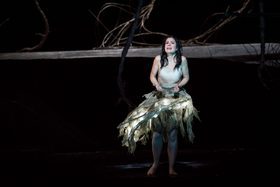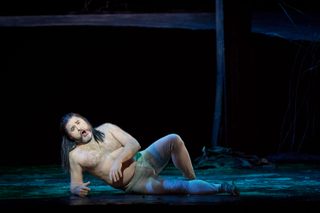|
Back
Forests and Trees Houston
Brown Theater, Wortham Theater Center
01/29/2016 - & January 31, February 6, 9, 12, 2016
Antonín Dvorák: Rusalka, opus 114, B. 203
D'Ana Lombard (First Wood Nymph), Sofia Selowsky (Second Wood Nymph), Megan Samarin (Third Wood Nymph), Richard Paul Fink (Vodník), Ana María Martínez (Rusalka), Jill Grove (Jezibaba), Chris Bozeka (Hunter), Brian Jagde (Prince), Keith Jameson (Gamekeeper), Mane Galoyan (Kitchen Girl), Maida Hundeling (Foreign Princess)
Houston Grand Opera Orchestra and Chorus, Harry Bicket (conductor)
Donna Stirrup (director), Rae Smith (set and costume designer), Paul Constable (lighting designer) 
A. M. Martínez (© Lynn Lane )
Dvorák's most well-known opera, Rusalka, owes its ongoing place in the repertoire largely to star sopranos looking to expand upon the work's famous aria, "Měsícku na nebi hlubokém" (commonly known as the "Song to the Moon"). Renée Fleming recently returned the Czech fairytale to the Metropolitan Opera, and the current production, which originated at Glyndebourne, was conceived by Melly Still for Houston Grand Opera studio alumna Ana María Martínez. There is much to treasure, especially vocally, but there is also much distraction in the overwrought visual design.
Martínez continues to impress in Houston and, while her Carmen still resounds with me the most, she has certainly grasped the difficult nuances of Rusalka and gives a well-rounded rendition. The "Song to the Moon" is deftly woven into an evolving character instead of sticking out as a single moment, and Martínez's physicality in the second act, where her character is struck silent, is impressive.

R. P. Fink (© Lynn Lane )
Two other roles are necessities for a satisfactory production-Rusalka's father, Vodník, a water-goblin, and her suitor, an anonymous Prince. Still makes a grotesque toad character out of Vodník, and Richard Paul Fink sings appropriately. Bare-chested and clad in skin-tone tights, he is hoisted about by dancers to give the illusion of a water sprite. In stark contrast, Brian Jagde's Prince has an emphasized masculine handsomeness, and a strong, resonant voice to match. There is little question why Rusalka chooses the young, attractive human over the sniveling amphibian, eschewing the notion that blood is thicker than water.
Like Martínez, Fink, and Jagde, smaller roles are given excellent voice. Jill Grove commands the stage as the witch Jezibaba, singing Dvorák's seductively sinister lines with aplomb. Maida Hundeling is an appropriately haughty Foreign Princess, possessing more shear vocal strength and beauty than Martinez, if less stage experience and nuance.
The stage is crowded with decor at nearly all points in the opera, leaving precious little room for key maneuvering to illuminate a rather complicated plot. Both vertical and horizontal dimensions are saturated, and one longs, at times, for a barer scenario, where the glories of voice can become the focus. Balletic forms, whether they be the aforementioned facilitators of Vodník or the hovering presences of Rusalka's nymph-sisters, are well-executed individually but quickly outstay their welcome, and simple opportunities to enhance the storyline are missed or muddled. Rusalka throwing Ježibaba's knife into the water is difficult to ascertain, and the wood nymphs' banishment of Rusalka could have been more strongly portrayed if they ascended away one by one, as Rusalka's pending isolation sets in.
Harry Bicket leads the HGO orchestra capably, but the type of profile he wishes to impart to Dvorák's colorful score is unclear. In the third act, in particular, there is a lack of momentum, and Bicket seems unable to overcome the stuttered pace of Dvorák's plethora of authentic cadences and false endings. From the pit, woodwind principals shine throughout, with memorable contributions from oboe and English horn, while off stage, the women of the HGO chorus shine.
Overall, this Rusalka is musically impressive, but doesn't quite make as strong an impact as I'd hoped. A production jam packed with beautiful and often clever visual stimuli can easily make the audience lost, and I longed for a moment when the singers could separate themselves from the decor, let their voices become the focus, and breathe.
Marcus Karl Maroney
|